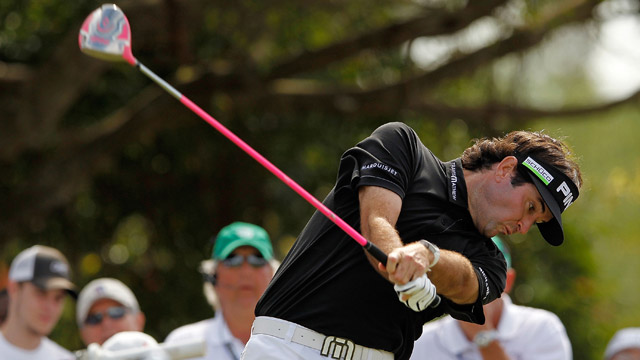NEWS
Notebook: Ping to sell 5,000 copies of Watson's Masters-winning pink driver

That pink driver used by Bubba Watson is going to market.
Two days after Watson won the Masters, Ping said it would sell 5,000 limited-edition G20 drivers with the pink shaft and head. The drivers sell for $430, and Ping said it would donate 5 percent to a fundraising campaign called, ''Bubba Long in Pink. Driven by Ping.''
As part of the campaign, the Phoenix-based company donated $10,000, along with $300 for every drive Watson has hit this year. To date, the campaign has generated $61,600 for charity.
Watson, meanwhile, launched ''Bubba & Friends Drive to a Million'' in January with hopes of raising $1 million for charities this year.
''Even prior to his win at The Masters, golfers were requesting pink G20s,'' said John Solheim, chairman and CEO of Ping. ''Through word of mouth, social media and phone calls, the interest was extremely high. We want to satisfy that demand while bringing even more visibility to Bubba's goal of raising $1 million.''
Olazabal speeds leaving Masters, gets $621 ticket
NOT SO FAST: Speeding between the Masters and his next tournament cost Jose Maria Olazabal $621 when a Georgia sheriff's deputy pulled him over for driving 97 mph on a rural highway.
Olazabal agreed to follow a deputy to the Effingham County Sheriff's Office and pay the speeding ticket in cash. The Spaniard was stopped Monday afternoon traveling from Augusta to Hilton Head, S.C., for the RBC Heritage tournament, sheriff's spokesman David Ehsanipoor said.
Ehsanipoor said Tuesday that Olazabal ''apologized, he was cooperative and after the paperwork was done he went on his way.''
He says the deputy clocked Olazabal's Mercedes exceeding the posted limit of 65 mph on the rural stretch of Ga. 21, a divided four-lane highway near the Georgia-South Carolina state line.
Olazabal's manager, Sergio Gomez, did not immediately respond to an email seeking comment.
The two-time Masters champion wasn't jailed, but his mug shot was taken. Ehsanipoor said the sheriff's department photographs everyone who is brought in on a criminal charge or citation.
Olazabal, inducted into the World Golf Hall of Fame in 2009, has won 29 times around the world and played on seven Ryder Cup teams. He won the Masters in 1994 and 1999.
WHAT'S IN A NAME: The name of the most famous shot in Masters history makes no sense.
Augusta National came across two newspaper clippings from 1935 when Gene Sarazen holed a 4-wood for his second shot on the par-5 15th. Both referred to the shot as a ''double eagle.''
But if an eagle is two shots under par, a double eagle then would be four shots under par.
It's known as an ''albatross'' everywhere but in the United States, no doubt because of Sarazen, yet Sarazen once referred to his shot as a ''dodo,'' and so the mystery continues.
''I didn't know what a double eagle was until I came to the U.S.,'' Geoff Ogilvy once said. ''Maybe they couldn't think of a word for something better than an eagle, so they called it double eagle. But it's not really a double eagle, it's an eagle-and-a-half.''
Scoring terminology went to the birds long ago.
According to the ''Historical Dictionary of Golfing Terms,'' the word ''birdie'' came from the American slang of something special. The story goes that three men were playing the par-4 second hole at The Country Club in Atlantic City, N.J., when Ab Smith's second shot stopped inches from the hole and he called it a ''bird of a shot.'' That led to a shot one under par being called a birdie. That was in 1903.
Thus began the use of birds in scoring, such as an eagle, and so ''albatross'' makes sense.
''It's a good bird, isn't it?'' Ogilvy said. ''They fly across oceans. It's grand, which is what describes the shot.''
Grand, indeed, considering there have been only four such scores in Masters history, the most recent Louis Oosthuizen on the par-5 second hole Sunday.
DIVOTS: Greg Norman will be designing a course in Brazil, although it has nothing to do with the Olympics. He was chosen to build a course in the coastal city of Cabo de Santo Agostinho, about 1,500 miles north of Rio de Janeiro. ... One of the first things Bubba Watson did on his first day as Masters champion was to change his cell phone number. ''It's crazy how people get ur number,'' he tweeted. ... The last 14 majors have been won by 14 players, the longest stretch of parity since 15 major winners starting with Nick Price at the 1994 through Lee Janzen at the 1998 U.S. Open. ... Americans have won consecutive majors for the first time since Lucas Glover (U.S. Open) and Stewart Cink (British Open) in 2009.
STAT OF THE WEEK: Of the four players who made an albatross at the Masters, Jeff Maggert is the only one not to finish among the top 10. He made 2 on the par-5 13th in the final round of 1994 and shot 75 to tie for last place.
FINAL WORD: ''It's like Disneyland for the adults.'' -- Lee Westwood, on bringing friends to the Masters.
